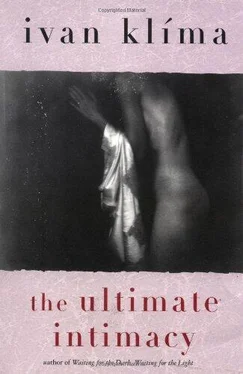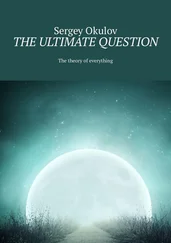Ivan Klima - The Ultimate Intimacy
Здесь есть возможность читать онлайн «Ivan Klima - The Ultimate Intimacy» весь текст электронной книги совершенно бесплатно (целиком полную версию без сокращений). В некоторых случаях можно слушать аудио, скачать через торрент в формате fb2 и присутствует краткое содержание. Год выпуска: 1998, Издательство: Grove Press, Жанр: Современная проза, на английском языке. Описание произведения, (предисловие) а так же отзывы посетителей доступны на портале библиотеки ЛибКат.
- Название:The Ultimate Intimacy
- Автор:
- Издательство:Grove Press
- Жанр:
- Год:1998
- ISBN:нет данных
- Рейтинг книги:3 / 5. Голосов: 1
-
Избранное:Добавить в избранное
- Отзывы:
-
Ваша оценка:
- 60
- 1
- 2
- 3
- 4
- 5
The Ultimate Intimacy: краткое содержание, описание и аннотация
Предлагаем к чтению аннотацию, описание, краткое содержание или предисловие (зависит от того, что написал сам автор книги «The Ultimate Intimacy»). Если вы не нашли необходимую информацию о книге — напишите в комментариях, мы постараемся отыскать её.
The Ultimate Intimacy — читать онлайн бесплатно полную книгу (весь текст) целиком
Ниже представлен текст книги, разбитый по страницам. Система сохранения места последней прочитанной страницы, позволяет с удобством читать онлайн бесплатно книгу «The Ultimate Intimacy», без необходимости каждый раз заново искать на чём Вы остановились. Поставьте закладку, и сможете в любой момент перейти на страницу, на которой закончили чтение.
Интервал:
Закладка:
Daniel naturally grew out of his adolescent dreams, but he always regarded his work as a mission and for a long time believed that moments of enlightenment would come again and that he would discover what was 'the truth' and find the answer to the most secret questions of being and non-being. And sometimes when he was talking to his first wife — who was capable of listening to him as no one had since — it would seem to him that he really would manage to get to the root of the mystery that veiled the manifestations of divine action in the world and discover the cause of human failings.
But when Jitka died, he seemed to dry up inside. He still strove to discharge conscientiously what he regarded as his mission; the question was what had he really accomplished — what, in retrospect, was there to show for it?
He had married several dozen couples, made sure the dead had a
decent burial, and possibly given some of the living encouragement by convincing them that life had some purpose. During his period in the Moravian Highlands, there had been some Catholics who came to his sermons as well as some 'non-believers' on the odd occasion, but even so, the church — built in the eighteenth century, when the anti-Protestant laws were repealed — remained very empty, as most people in the village and its environs had no interest in his message.
Since the Velvet Revolution, he had suddenly been allowed to appear on television and visit prisons, and yet this wasn't quite what his mother had expected of him, or what he himself had once dreamt about. Moreover, he was no longer convinced that there existed any ideas that were sufficiently wise, noble or significant to influence people's behaviour. People's behaviour tended to be influenced by ideas that lacked both wisdom and nobility.
On the lowest shelf there stood some boxes full of papers. The outside of the boxes bore inscriptions in his mother's elegant schoolmistress's hand: Richard's letters. Letters to me. Letters from the children. Official correspondence. Miscellaneous. Photographs.
What was he to do with these writings? Would he read them? Eva would most likely move into the flat. Before that happened, he would have to take away the letters. He would take them away unread and store them away somewhere in the cellar, where his children would find them after his death and dump them.
The photographs were also sorted into a whole lot of envelopes. He pulled one out. In a very amateurish, grey snapshot his mother was leaning against the fence of their villa in Střešovice holding a baby in her arms. The baby must have been him. The back of the photo bore the date: summer 1944. His mother was wearing a summer dress, which he could not recall, of course. The dress was shabby looking — it was the last year of the war. His father was in a concentration camp, his mother had been left on her own with the two children. Their father had returned only to be imprisoned again several years later. Their mother remained alone once more. No one even visited them. Only the old minister from their congregation called in from time to time and pressed a thousand-crown note on their mother towards the housekeeping. That minister was also long dead but he now discovered a photograph of him standing among a confirmation group. Daniel scarcely recognized himself, he was even thinner in those days and his forehead was partly obscured by hair.
And there were wedding photos of Jitka. They all stood there together. Only Rút was missing — she was already over the hills and far away. He turned over the photographs absentmindedly and returned them to their envelope: himself with Jitka with mountaineering ropes round their waists; his father; a coloured snap of Rút at the Yosemite Falls; the manse in Kamenice; a wedding photo with Hana. Another one with his mother sitting in her armchair bent slighdy over some sewing. The armchair still stood here by the bed. He recalled how when his mother did any sewing she would generally prick her fingers until they bled. The blood would distress him, or maybe it was his mothers clumsiness that upset him. He became aware of the tears burning his throat. As if he only now realized that he would never again set eyes on his mother, either here in her armchair or anywhere else on this earth.
He stuffed the box back into the wardrobe and tried to dispel his gloom by thinking of their next meeting which had to occur one day, although there was no telling when, where or how. But no sense of relief came. When they heard about the resurrection of the dead, some of them sneered, but others said, 'We want to hear you again on this subject. ' (Acts 17:32)
6
Matouš
Matouš Volek was born and grew up in Michle. His father had been a tailor's assistant — a very quiet and mild-mannered man. He died of belatedly diagnosed tuberculosis when Matouš was thirteen. A few days before his death, Matouš had observed above his fathers head a strange glow that quickly grew pale before disappearing entirely. It had frightened the boy but he never told anyone what he had seen.
Matouš inherited his father's scrawny and rather stunted body, as well as his long-sightedness, diligence and meditative tendencies, not to mention pathological mood swings and a fear of women.
Matous's mother had not remarried and the devotedness that was her main character trait was transferred from the ailing husband to the healthy son. She worked as a postwoman and her daily duties entailed
doing the rounds of dozens of streets which at the time were mosdy made up of low, temporary dwellings. In spite of this, she would manage to return home in time to prepare her son's lunch and chat to him about his problems. She even tried helping him with his studies by testing him on his school homework after quickly reading up the subject beforehand in his textbook. She wanted him to go to university so that he could be educated and learned, and respected by all, preferably becoming a doctor, or a civil engineer at least.
Matous indeed went on to university, but to study something else entirely, namely, oriental languages at the Arts Faculty. Having a gift for languages and virtually no other interests (he didn't go out with girls, or rather none of them felt inclined to go out with him), he made full use of the opportunity and learnt Chinese. He acquainted himself with Chinese thinking, being attracted most of all to Taoism at that time, although, like the majority of Europeans, he only selected certain elements from it for his own lifestyle; he certainly proved incapable of freeing himself totally from his own self.
When, in 1968, Soviet troops invaded the Republic, Matouš was in his third year at university and like most of his fellow students he joined the street demonstrations to protest against the invasion. As the political situation deteriorated, however, he had to decide whether to go on protesting and thereby lose the opportunity to make his mark in the profession for which he had prepared himself, or to take the chance then offered for someone with no past. The prospect of losing his career didn't appeal to him. One of the wise sayings of Lao Tzu stressed that only the person capable of adapting to everyone would emerge the victor over all. 'Reserve your judgments and words and you maintain your influence.'
He therefore decided to coexist with the revamped ancien régime. This entailed joining the prescribed organizations, voting in the sham elections and not taking part in anything that might cast doubts on his loyalty, but also not getting involved in anything that would offend his own conscience. After all, the sage relies on the hidden life and nonaction, in other words he argues with no one and thus avoids unnecessary quarrels. His best teachers were forced to leave the faculty but those who had reached the same decision as Matouš remained. There was no great change in the language teaching, but the associate professor purged the history syllabus of the most stimulating and also the most significant epochs in favour of the most recent Communist
Читать дальшеИнтервал:
Закладка:
Похожие книги на «The Ultimate Intimacy»
Представляем Вашему вниманию похожие книги на «The Ultimate Intimacy» списком для выбора. Мы отобрали схожую по названию и смыслу литературу в надежде предоставить читателям больше вариантов отыскать новые, интересные, ещё непрочитанные произведения.
Обсуждение, отзывы о книге «The Ultimate Intimacy» и просто собственные мнения читателей. Оставьте ваши комментарии, напишите, что Вы думаете о произведении, его смысле или главных героях. Укажите что конкретно понравилось, а что нет, и почему Вы так считаете.






![Theresa Cheung - The Dream Dictionary from A to Z [Revised edition] - The Ultimate A–Z to Interpret the Secrets of Your Dreams](/books/692092/theresa-cheung-the-dream-dictionary-from-a-to-z-r-thumb.webp)





